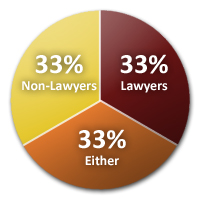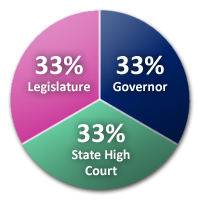Authors: Alfred A. Lindseth and Eric A. Hanushek
| State High Court & Judicial Nominating Commission | Composition & Terms of Judicial Nominating Commission | Judicial Selection Process | Legal Authority |
|---|---|---|---|
*2 lawyers and 2 non-lawyers Terms: 4 years (varied) |
General
Interim Vacancies
|

Percentage of Lawyers on the Nominating Commission

Who Selects the Nominating Commissioners?
Latest News
- Analysis | Trump's attorney: Presidential coup attempts may be unprosecutable - The Washington Post
- The wild past 24 hours of Trump legal news, explained - Vox.com
- Trump hush money trial: Tabloid publisher David Pecker continues testimony - The Associated Press
- Now in America: New York Supreme Court overturns Harvey Weinstein's 2020 rape conviction - WKYC.com
- Justices Seem Ready to Limit the 2020 Election Case Against Trump - The New York Times
- Election 2024 latest news on the presidential race - The Washington Post
- Six takeaways from Trump immunity hearing and New York hush money trial - Al Jazeera English
- Harvey Weinstein's rape conviction is overturned by top New York court - Reuters.com
- Friday Briefing: Supreme Court Hears Trump Immunity Case - The New York Times
- The Supreme Court Hints at a Break for Trump - The New York Times
Scholarship & White Papers
-
New York State’s Highest Court Reverses Major Tort Award in World Trade Center Bombing Litigation
On September 22, 2011, the New York State Court of Appeals issued a decision reversing a major tort award. In In re World Trade Center Bombing Litigation Steering Committee v. Port Authority of New York and New Jersey,1 the basic underlying facts were not in dispute. The Port Authority was a public entity created in a 1921 compact between New York and New Jersey to oversee critical centers of commerce, trade, and transportation hubs (e.g., airports, bridges, tunnels, etc). It is a financially self-reliant public entity.2 One of the properties it developed, constructed, and operated was the World Trade Center. The Port Authority operated a security force of forty police officers within the confines of the World Trade Center.
-
New York’s Highest Court Narrows the Assumption of Risk Defense to Tort Liability
On April 6, 2010, the New York State Court of Appeals rejected use of the assumption of the risk doctrine to nullify a school district’s duty to supervise the children within its care.1 The ruling would likely have been uncontroversial if the majority had limited its pronouncements to those necessary to resolve the present dispute: a child cannot assume the risk of injuries from “horseplay” enabled by his teachers’ failure to supervise him. This proposition provided the basis for the unanimous judgment in Trupia v. Lake George Central School District disallowing the defense in that case. However, the court split 4-3 in its reasoning, with the minority concurrence decrying the “extended dictum” in which the majority reconceived and narrowed the defense of assumption of the risk in New York State.
-
New York’s Highest Court Backtracks on Property Owners’ Rights in Eminent Domain Case
In In re Goldstein v. New York State Urban Development Corp., New York State used its power of eminent domain to seize property that would be included in a private developer’s twenty-two-acre mixed-use development project.1 The project was to include a sports arena for a professional basketball team and numerous high rise buildings, the latter of which would serve both commercial and residential purposes.


 New York Court of Appeals
New York Court of Appeals